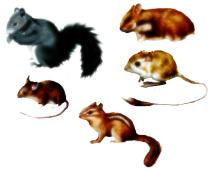April 2022
As part of the Amherst College Integrated Pest Management (IPM) Program, the control of mice and other rodents, including chipmunks and squirrels are immediately addressed by the appropriate College department(s) and/or our licensed pest management company.

Reporting
Persons who have, or believe they have a pest related concern should immediately report the condition to the Amherst College Service Center servicectr@amherst.edu or by calling (413) 542-2254.
- Emergency (after hour) reporting should be done through the Amherst College Campus Police (413) 542-2291.
At the time of initial report, the Amherst College Service Center will request the response of Environmental Health and Safety, the Custodial Department and/or the pest management company. The level of response is often dependent on the type of pest, the building and the health and safety risks, such as bee sting allergies. Regardless, all pest related issues are responded to with-in 24 hours of the initial report, as the IPM plan dictates prompt corrective action and prevention of a more significant condition.
Response
As indicated above, all pest related concerns, both known and potential are responded to within 24 hours. The initial response often focuses on managing the environment, such as housekeeping practices, eliminating pest access and educating the occupants of the building to prevent a more significant infestation or problem. The IPM program for any pest, including mice follows the following guidelines;
1. Survey
§ Building access
§ Building conditions (HVAC, plumbing, water infiltration etc)
§ Housekeeping conditions (cleaning, food and waste handling, harborage etc.)
§ Review of nationally recognized guidelines for the specific type of pest
§ Response protocols using past practices or new strategies in cooperation with the pest management company.
2. Interventions
§ Building modifications, such as limiting pest access
§ Correcting any contributing adverse environmental conditions, such as standing water
§ Improving housekeeping practices by frequently cleaning, properly packaging food, disposing of waste and limiting the concealment of the pest.
§ Incorporating the response and treatment protocols of the pest management company
- Baits, humane-type traps, and only when necessary use of chemical treatments that are as environmentally-friendly as possible
At the request of the campus community, snap trap and glue board use should be limited to inaccessible areas, and only as a last resort.
Amherst College IPM program includes a contract with a licensed pest management company. The program stipulates that the pest management company make weekly inspections of specified areas, as well as areas that were recently identified, regardless of pest type.
- Amherst College Service Center maintains a weekly inspection report with the pest management company that includes;
c Detailed complaint, including the type of pest
c Building, room or area
c Reporting party(s)
c Treatment type and location
c Follow-up
3. Evaluation
It is the responsibility of Amherst College and the pest management company to perform on-going inspections of the location and type of pest to determine if the corrective actions and preventive maintenance practices are working to control the pest concern.
The Office of Environmental Health and Safety and the Facilities Department will develop protocols, procedures and training programs to target a particular pest or area of concern, as needed.
For additional assistance and information, please contact the Amherst College Service Center at: Servicectr@amherst.edu or by calling (413) 542- 2254, or the Office of Environmental Health and Safety at: ramears@amherst.edu or (413) 542-8189.